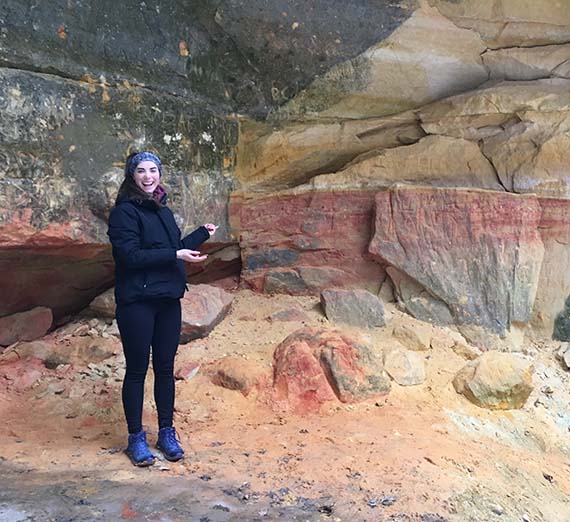Meet Dr. Madeleine Mathews

This month's installment in the ongoing series of Q&A sessions from the Office of Sustainability catches up with Dr. Madeleine Mathews. Keep reading to learn about Madeleine, her views on sustainability, and how she implements sustainable practices into her daily life.
What is your position/department/year/major/club affiliation at Gonzaga?
Assistant professor jointly appointed in the departments of Chemistry & Biochemistry and Environmental Studies & Sciences. This is my first year at Gonzaga!What does sustainability mean to you?
To me, sustainability describes balance – thinking about how something can be perpetual, continual. This can be applied to human resources – how can you form a sustainable study plan that allows you to review class material without putting in so much time that you stop taking care of yourself? It can also be applied to environmental systems – can we develop agricultural systems in a way that allows everyone access to enough food, without creating nutrient excess or destroying soil systems?
How have you been involved in promoting sustainability on campus?
This is my first semester at Gonzaga, so I am just starting to get involved on campus. I am enjoying learning more about the sustainability efforts on campus though – like the many compost bins around.
What are some things you do in your personal life to live sustainably?
I think about sustainability in my personal life quite a bit, and often how difficult it is to truly be sustainable. I don’t currently own a car, so I either bike, walk or take the bus to where I need to go around Spokane. If my partner and I want to travel further, we will rent a car (sometimes electric). I also try to be mindful of the waste I generate – when I go to the grocery store, I bring produce bags for fruit/veggies and big canvas bags to use instead of paper or plastic grocery bags. There is also a local bulk store that I like to go to for items like rice or oatmeal. I just signed up for the LINC box on campus too, which is a community-supported agriculture weekly box that supports local farming efforts – you pay per box and receive a great assortment of local fruits and veggies.
Even with all these efforts to live more sustainably, I am still surprised when I think about how much waste we produce in our 2-person household. Some of this is systemic and some is cultural; in the end it is waste, nonetheless.
How could Gonzaga continue to improve its sustainability efforts?
In looking through the sustainability projects already on-going, it is clear that sustainability is part of Gonzaga’s mission statement! However, there is always more to do, to work towards this balance of reducing impact on the world around us. I know many faculty are already involved in teaching and discussing sustainability with students, and I think this is so important, especially when people in different fields of study get together as each has a different perspective on what sustainability is and what it could look like. Continuing these efforts of discussing sustainability in the classroom allows students the option to view sustainability from many different perspectives – literature, science, ethics, etc, and to think critically about what it means for a person to be sustainable and for a society to be sustainable.
How will you continue to promote sustainability at Gonzaga?
I would like to continue these important discussions of sustainability, with students and with colleagues, both in the classroom and beyond. The way our society is currently set up, it is difficult to make change as one person. But as we continue to educate ourselves and others, society will change.
How do you see sustainability intersecting with social justice issues on an institutional, country, or global scale?
Many of the sustainable choices I make in my life intersect with privilege – I am lucky enough to have a job that provides me the means to find an apartment within biking distance of work and that is also conveniently located near a bus line that takes me directly to work as well. There is also privilege in the ability to go to a bulk food store, which tend to be a bit more expensive than the average grocery store.
In our current society in the Pacific Northwest of the US, the options that are either less expensive or that take up less time often involve increased waste, fewer health benefits, or increased CO2 output. Each choice we make weighs the pros and cons of this – but in terms of social justice issues, a person may not have the ability or the means to afford to care about making sustainable choices. Additionally, often environmental problems most impact those who are marginalized in society – whether due to racism, poverty, disability, or more.
I’m not sure what the answer is here – as a society, we have many, many changes to make before we can consider ourselves either socially just or sustainable. However, as we think about how to make these changes, considering social justice in sustainability efforts is a must. Sustainability initiatives must be accessible for everyone in order to truly be sustainable and long-lasting.
